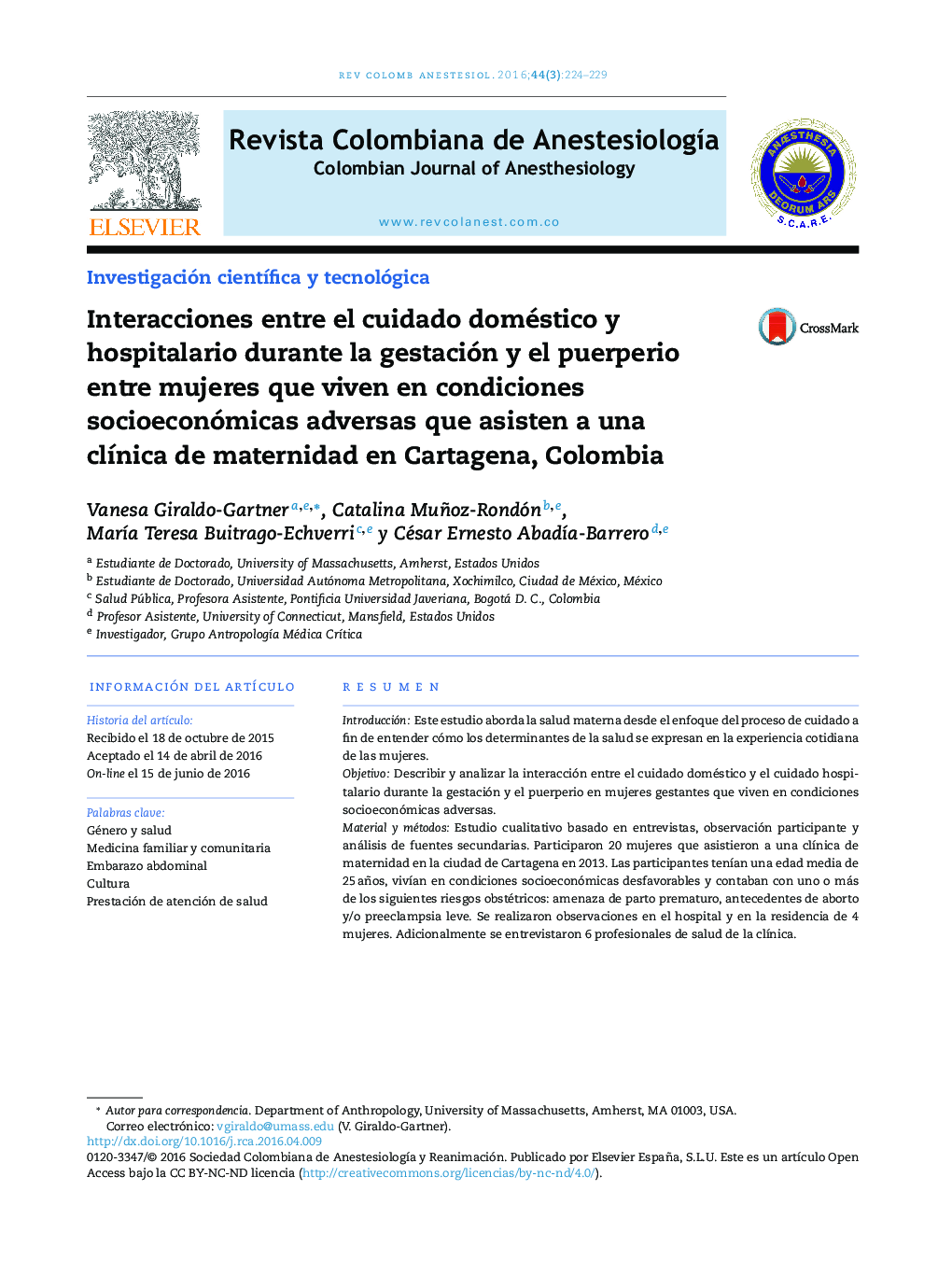| Article ID | Journal | Published Year | Pages | File Type |
|---|---|---|---|---|
| 2767579 | Revista Colombiana de Anestesiología | 2016 | 6 Pages |
ResumenIntroducciónEste estudio aborda la salud materna desde el enfoque del proceso de cuidado a fin de entender cómo los determinantes de la salud se expresan en la experiencia cotidiana de las mujeres.ObjetivoDescribir y analizar la interacción entre el cuidado doméstico y el cuidado hospitalario durante la gestación y el puerperio en mujeres gestantes que viven en condiciones socioeconómicas adversas.Material y métodosEstudio cualitativo basado en entrevistas, observación participante y análisis de fuentes secundarias. Participaron 20 mujeres que asistieron a una clínica de maternidad en la ciudad de Cartagena en 2013. Las participantes tenían una edad media de 25 años, vivían en condiciones socioeconómicas desfavorables y contaban con uno o más de los siguientes riesgos obstétricos: amenaza de parto prematuro, antecedentes de aborto y/o preeclampsia leve. Se realizaron observaciones en el hospital y en la residencia de 4 mujeres. Adicionalmente se entrevistaron 6 profesionales de salud de la clínica.ResultadosLas condiciones socioeconómicas adversas que reportaron las mujeres y las dinámicas familiares de su contexto determinan sus vivencias de maternidad. Los familiares son los principales agentes de cuidado. Los cuidados más importantes están relacionados con actividades físicas, transporte, alimentación y exposición al ambiente. Los cuidados domésticos se trasladan al ambiente hospitalario.ConclusiónLos modelos de atención hospitalarios deben reconocer el rol de las redes de apoyo de las mujeres como guiadores del proceso de cuidado y entender las condiciones de vida de las mujeres para adaptar los servicios a las necesidades de las pacientes y evitar reproducir situaciones de desigualdad.
IntroductionThis paper proposes an approach to maternal health from the care process perspective to understand how determinants of health manifest in the daily experience of women.ObjectiveTo describe and analyze the interaction between the domestic and clinical care during pregnancy and post-partum among women who live in adverse socio-economic conditions.Material and methodsQualitative study based on semi-structured and in-depth interviews, participant observation, and analysis of secondary sources. Twenty women who received care at a maternity clinic in the city of Cartagena, Colombia, were interviewed. Participants had an average age of 25, lived in adverse socio-economic conditions and had at least one of the following obstetric risks: preterm labor symptoms, previous abortions, or mild preeclampsia. Participant observation took place at the clinic and at the residence of 4 patients. In addition, 6 in-depth interviews were conducted with health workers of the clinic.ResultsThe socio-economic conditions of women and their family dynamics determine their experiences of maternity. Relatives, usually other women, are the main agents of care. The most important care activities revolve around physical activities, transportation, nutrition, and exposure to the environment. The characteristics of domestic care play an important role in the clinical environment.ConclusionFamily-centered care requires acknowledging the role of relatives and other members of the women's social networks as guides in the healthcare process. Likewise, recognizing the socio-economic conditions of women requires adapting health services to the needs of women and their families in order to avoid reproducing social inequalities.
